
A decade of dominance

hen Professor Gregory H. Fox arrived at the Law School in 2002, he began recruiting students for the Philip C. Jessup International Law Moot Court Competition. The oldest of its kind, the competition began in 1960 and simulates a case before the International Court of Justice, also known as the World Court. The International Court of Justice is the supreme judicial organ of the United Nations system and can hear cases between countries concerning any issue of international law. Recent issues debated in the Jessup include self-defense against terrorist groups, diplomatic immunity, environmental degradation, cyberattacks and foreign election subversion.
The Jessup is also the world’s largest moot court competition, hosting roughly 3,000 law students from 700 law schools in over 100 countries. Each country holds a national tournament to determine which schools will advance to the international rounds held in Washington, D.C. In the United States, nearly 100 law schools participate each year. Of these, 12 can qualify for the international rounds, with two from each of six geographic regions. Wayne Law is in the Midwest region.
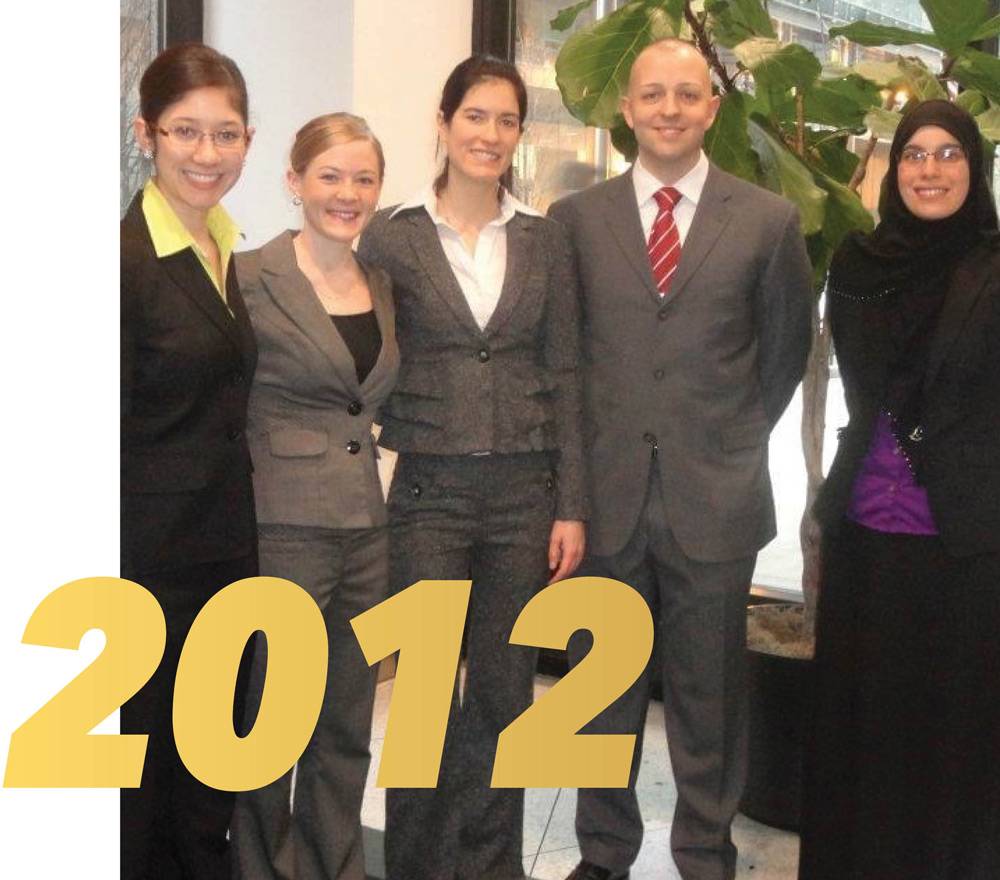
“I’m still angry about a quarter-final round that Oday Salim ’08 and Caren (Bales) Ries ’09 lost that they really, really should have won,” said Fox, a widely published scholar of international legal topics. Salim is now director of the Environmental Law and Sustainability Clinic at the University of Michigan Law School and Reis practices at Cleland Collaborative Divorce.
In 2012, the Wayne Law team also came close, dominating the regional competition in Chicago. The team of Nicholas Mull ’12, Natalia Vieira Santana ’12, Rachel (Hom) Margiewicz ’13, Nadia Igram ’12 and Maggie Stalker ’12 finished first in the preliminary rounds and placed three of its four speakers in the top 10, with Mull winning the Best Speaker Award. The team’s “memorial” (the international law term for brief) also earned top honors. But Mull and his partner Margiewicz lost a split decision in the quarterfinals and didn’t go to Washington.
The next year, Mull had graduated, but he had instilled a spirit of hard work and exacting standards in the team, drawing on his years of Marine Corps service before starting law school.
“I had already completed two combat deployments in Iraq between 2005 and 2007,” he said. “Those experiences put me in a different frame of reference than many students.”
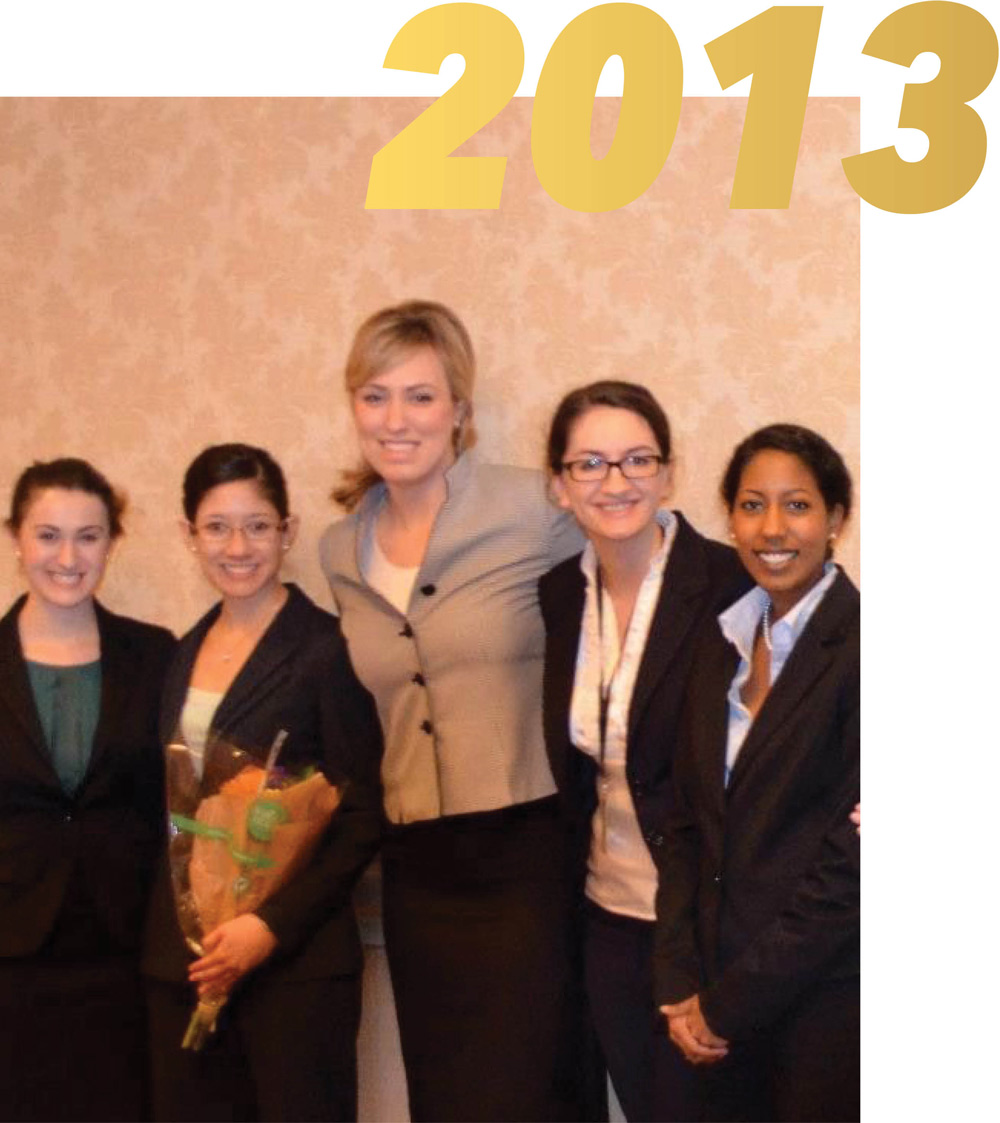
“All of this work gave us the foundation to hit the ground running when the Jessup problem was released in the fall,” said Margiewicz, now director of prelaw services at JD Advising.
Teammate Bonsitu Kitaba ’14, now deputy legal director at the ACLU of Michigan, recalled “endless practices together in the moot court room in front of guest judges — and they were always eye-opening, sometimes building one’s confidence and sometimes shattering it, causing us to go back to the drawing board.”
The hard work paid off. The team won the regional tournament, with team member Kaitlyn Cramer ’13 — now a partner at Novara, Tesija, Catenacci, McDonald & Baas — earning First-Place Speaker. They were headed to Washington. At the international round, with a 3-1 record, the team placed 18th in the preliminary rounds out of almost 100 participating law schools. Margiewicz was the seventh-ranked speaker in the world out of several hundred. The team advanced to the first elimination round where they lost a close decision to the National Law School of India University, the eventual winner of the entire competition.
The success of the 2012-13 team began a remarkable chapter in the Law School’s history. In the 10 years since, Wayne Law Jessup teams have qualified for the international rounds eight times, winning the Midwest regional five out of those eight years (no regional tournament was held from 2020 to 2022 due to COVID-19). A Wayne Law team member has finished in the top 10 oralists at the regional tournament in five out of the eight years it was held, and in four of those five years, a Wayne Law student received the First-Place Oralist Award. Wayne Law memorials were in the top 10 at the regional tournament every year but one.
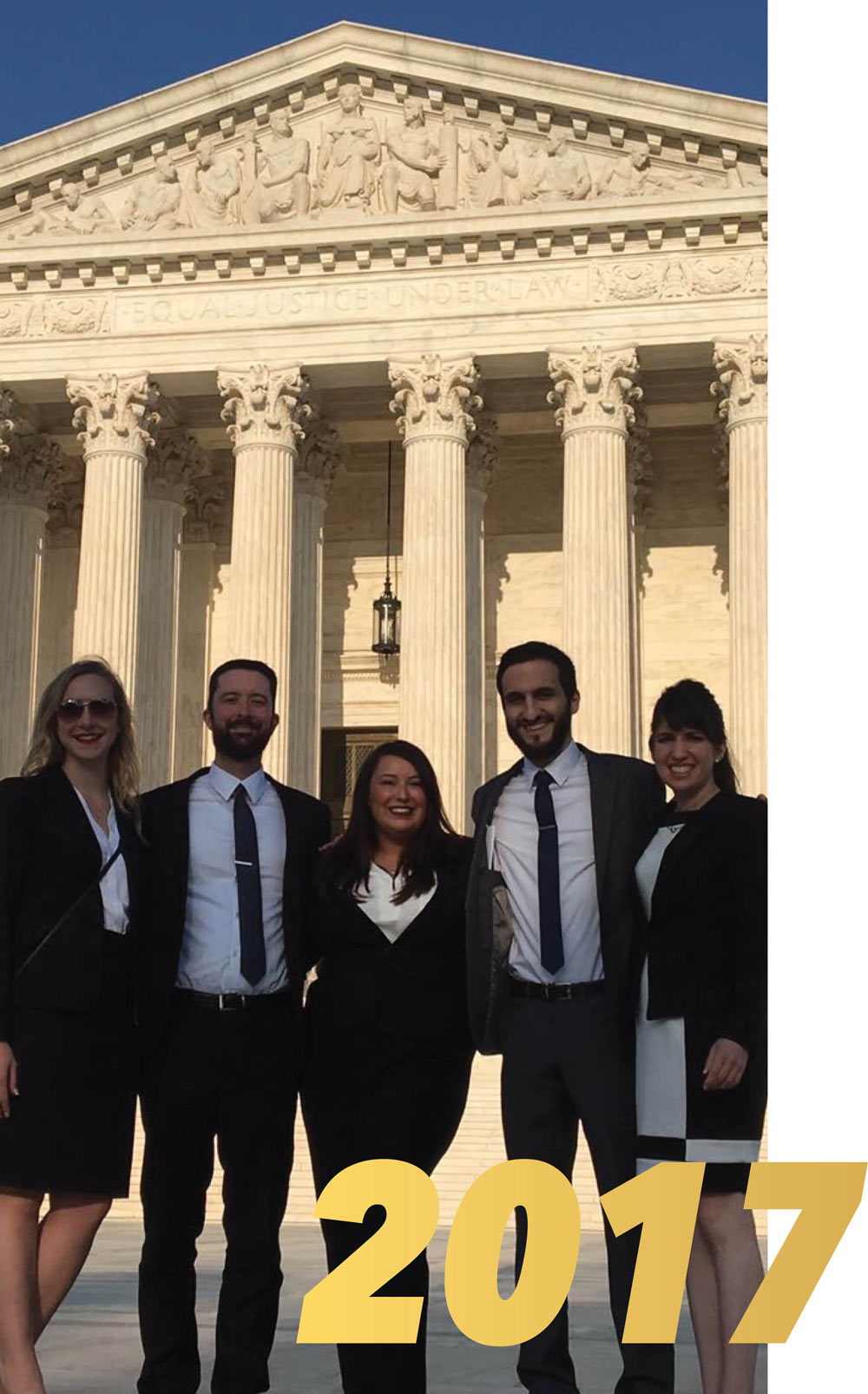
The greatest success came in 2017-18, with the team of Nicole (Pitchford) Haelterman ’18, Adam Winnie ’18, Emad Hamadeh ’19, Aaron Shuman ’18 and Layla Zarkesh ’19. The team won the regional tournament, with Haelterman taking the first-place Speaker Award, Winnie taking second and Hamadeh third. At the international rounds in Washington, the team had the fifth-best combined memorial score, and Haelterman and Hamadeh were ranked the best applicant team internationally. Haelterman was the fourth-best oralist in the world. The team made it through the first two elimination rounds and lost to Yale Law School in the round of 16.
To put this decade of achievement in perspective, consider the other law schools competing against Wayne Law in 2017-18: At the regional tournament, which Wayne Law won and nabbed the top three Speaker Awards, 19 law schools and 76 speakers participated. Among the schools Wayne Law bested were the University of Michigan, University of Chicago, University of Notre Dame, Ohio State University, University of Wisconsin and University of Iowa. At the international tournament, where Wayne Law finished in the top 16 and Haelterman was the fourth-place speaker, 121 law schools and 484 speakers participated. Among the 99 schools finishing behind Wayne Law were NYU, King’s College London, Peking University, University College London, UC Berkeley, Hebrew University (Israel), Sciences Po Paris and University of Virginia.
Wayne Law Dean Richard A. Bierschbach said that the Jessup program is “one of our proudest achievements. I cannot say enough about the work ethic and dedication of the students who have brought home Jessup honors to Wayne Law year after year, as well as their outstanding faculty and alumni mentors and coaches.”
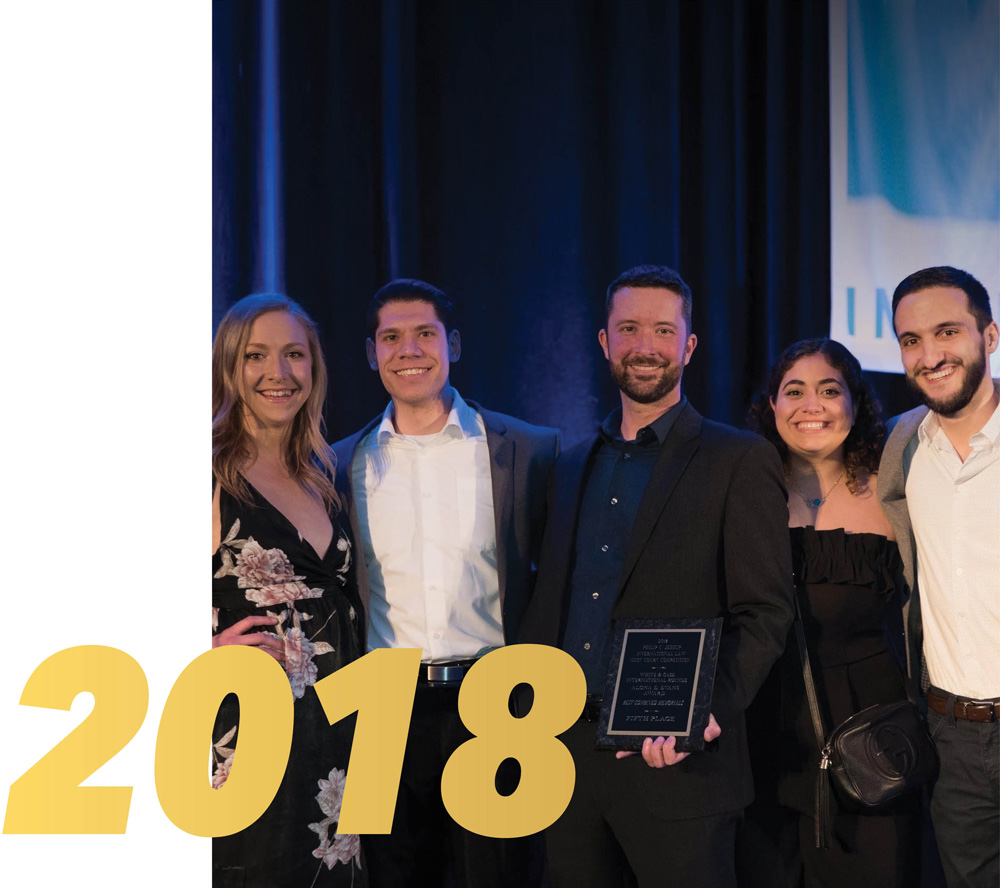
Benn added that Wayne Law has advanced to the international rounds “as frequently as almost any other law school in the United States.”
The road to Washington
Every May, after classes and exams are over, team members meet with Fox to map out a plan for the coming year. Most Wayne Law Jessup teams, limited by the rules to five students, consist of continuing 3Ls and new 2Ls. Over the summer, they complete background readings, including an introductory treatise on international law. Before classes begin in the fall, Fox holds intensive workshops on the nature of the international legal system and its specialized research methods. These are essential, since the materials that make up public international law — largely treaties and the accumulated practice of nations over time — are entirely new to the students. And research tools they learned about in their first year, such as Lexis or Westlaw, are only marginally helpful in finding relevant sources.
Research begins once the Jessup problem is released in mid-September, building toward submitting two memorials — one for the applicant and one for the respondent — in mid-January. Then, the team switches to practice oral arguments, holding as many as 15 practice rounds in the five weeks leading up to the regional tournament in February. The judges are Law School faculty members, prominent Detroit attorneys and a network of Wayne Law Jessup alumni who return to help the team. The questioning is intentionally relentless.
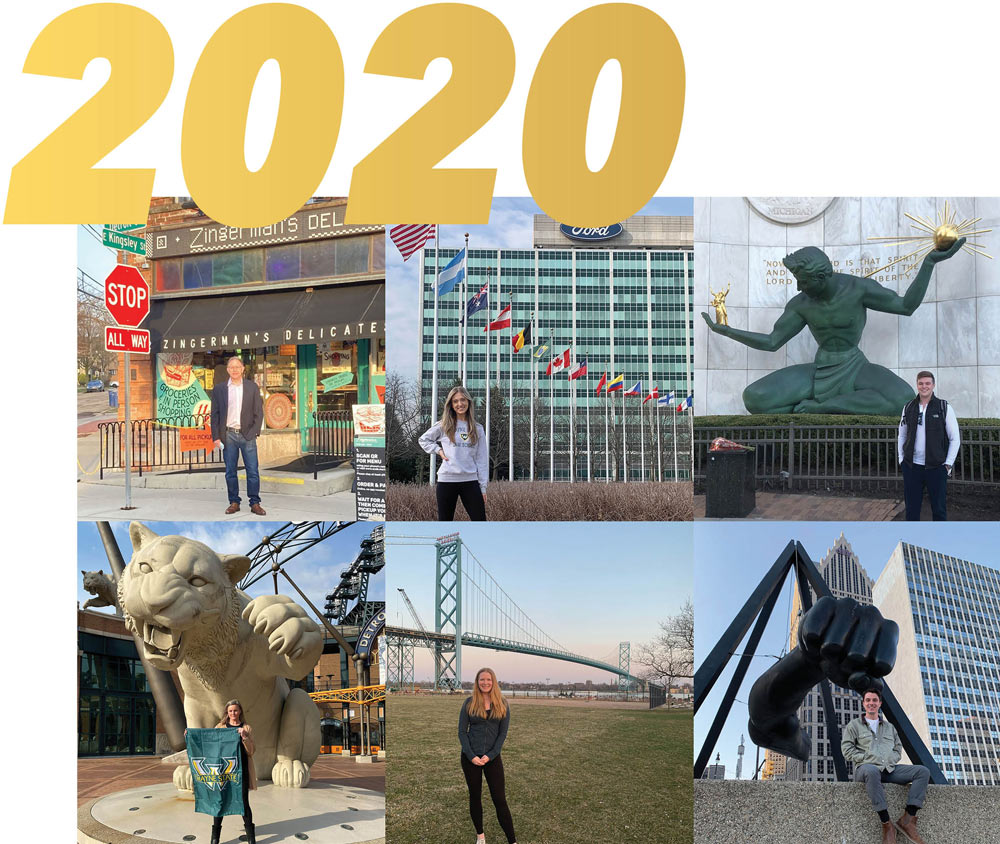
Recalling the practice rounds, Hamadeh said, “Arguments we held near and dear were effortlessly dismantled, leaving us running back to the drawing board.” Picking up the pieces after these grillings, he said, “was a marathon of perseverance.”
But the preparation pays off, said Blythe Collins, chancellor of the 2022-23 team. “It’s amazing how you can start a semester with absolutely no clue of how to address a problem and then feel confident enough to argue about it in front of international law professors by the end.”
Another reason for the team’s success is that the Jessup teaches a range of basic legal skills that elevate both writing and effectiveness in oral argument. Many describe their experience in remarkably similar terms: all-encompassing and all-consuming.
“When I look back upon law school, Jessup is the first thing I think about,” said Mull. Margiewicz considered Jessup “the highlight of my law school experience.” Haelterman, now completing a clerkship for 6th U.S. Circuit Court of Appeals Judge Richard A. Griffin, said that “Jessup shaped everything I did in law school, and frankly, my career.” Shuman, who works on estate planning and administration at Buhl, Little, Lynwood, & Harris in East Lansing, said, “There were many times when it felt as though Jessup was my focus and law school was a side job.” Winnie, now a commercial litigator at Hickey, Hauck, Bishoff, Jeffers & Seabolt, put it simply: “Jessup was my law school experience.”
The seemingly endless rounds of practice arguments hone the students’ oral advocacy skills and thicken their skins. One hallmark of the Wayne Law teams is that they make their 40-minute oral arguments without notes, a feat that often draws praise from judges. In the period between submission of the memorials in mid-January and the Chicago tournament in mid-February, students must go from test-running arguments under withering questioning of practice rounds to memorizing polished final versions of arguments that have changed substantially since the written submissions.
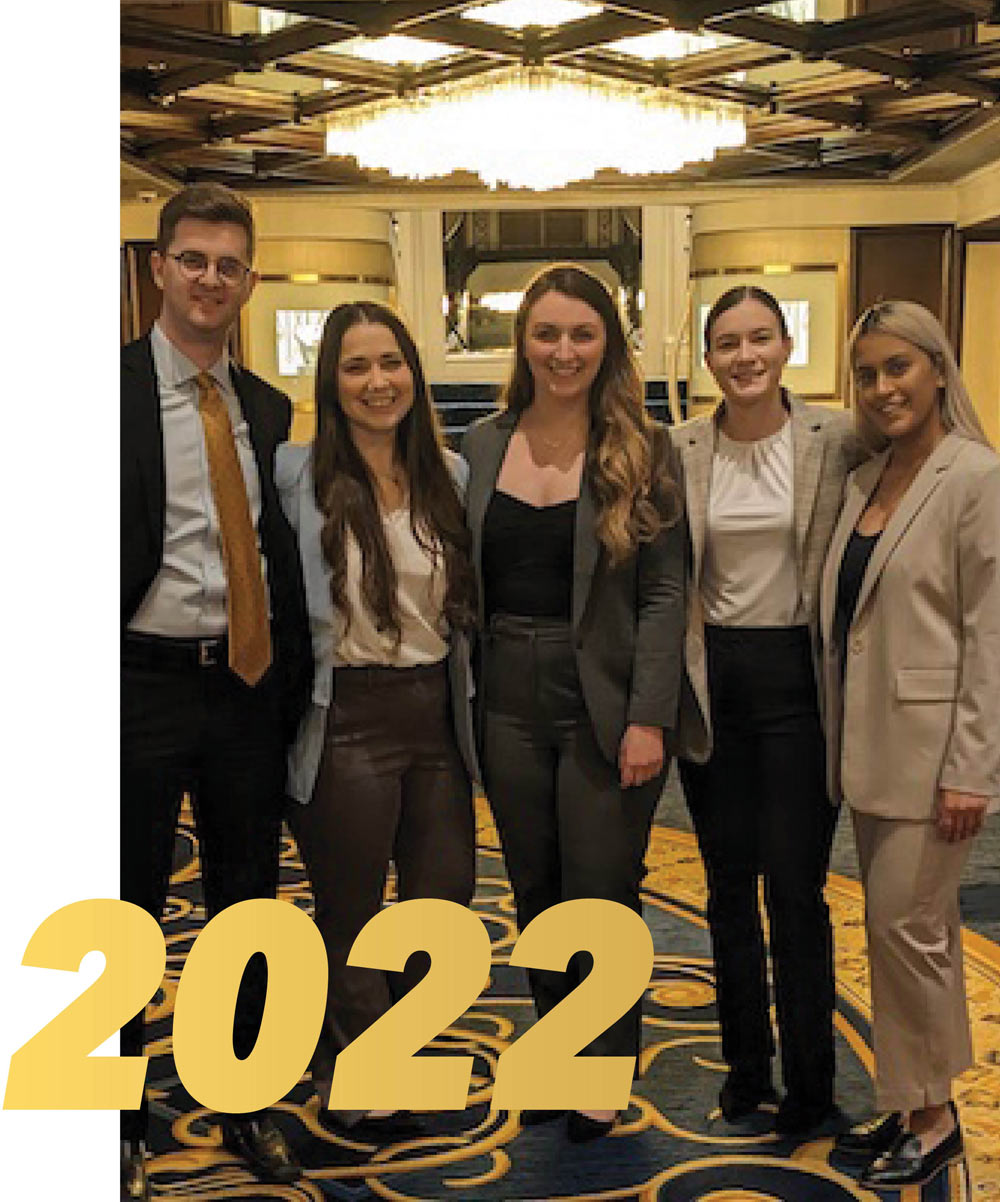
Not surprisingly, team members have found that the Jessup improved their research, writing and oral advocacy skills.
“I have always enjoyed writing,” said Winnie, “but Jessup took my writing from good to exceptional.” Recently, he and his wife found themselves in the atrium of a local shopping mall, where in the fall of 2016 he had “sat for hours drafting and redrafting my first Jessup memorial.” Standing in that same place more than six years later, he told his wife, “‘That’s where I sat when I became the writer I currently am.’ She thought I was being dramatic, but it’s true!”
The third reason for the Wayne Law team’s success, according to many members, is the thrill of being part of a winning tradition.
This is reinforced by the large and growing network of Jessup alumni who return to judge practice rounds and each year gather for a party at Fox’s home in Ann Arbor.
“The alumni still get excited for the day in September each year when the problem drops,” said Collins, adding that former Jessup members, “are also the team’s biggest fans on competition weekends.”
Knowing that they contribute to a legacy of success makes team members work hard to live up to that tradition.
“Jessup became an all-consuming part of my second and third years of law school,” said Kitaba, “and I loved every minute.”
The future of Jessup
The winning tradition at Wayne Law shows no signs of abating. Many students are attracted to the Law School by its Program for International Legal Studies, overseen by Fox. Jessup students can take a wide range of international law courses from Wayne Law faculty members Charles (Chip) Brower, Paul R. Dubinsky, Julia Ya Qin, Brad R. Roth and others. The program sponsors a speaker series and summer internships abroad, and it administers student and faculty exchange programs with partner law schools in the Netherlands, Taiwan and Slovenia.
The network of committed Jessup alumni continues to grow, which comes as no surprise. As Fox said, “Each year, we get a huge group of smart and motivated first-year students applying to join the Jessup team.”
Wayne Law Jessup Teams Qualifying for the International Rounds, 2013-23
Bonsitu Kitaba
Kaitlyn Cramer
Jessica Wayne
Klaudia Nikoli
- Champions
- Advanced to elimination rounds
- 19th-Best Memorial
Milica Filipovic
Shahad Atiya
Elizabeth Cacevic
Fatima Bolyea
- Champions
- Best Speaker (Frank Moran)
- Best Memorial
- 12th-Best Speaker (Frank Moran)
Elaina Bailey
Elizabeth Cacevic
Shahad Atiya
Shahar Ben-Josef
- Champions
- Best Memorial
- Advanced to elimination rounds
Elaina Bailey
Adam Winnie
Aaron Shuman
Nicole (Pitchford) Haelterman
- Champions
- Third-Best Memorial
- Advanced to elimination rounds
- 19th-Best Memorial
Aaron Shuman
Nicole (Pitchford) Haelterman
Emad Hamadeh
Layla Zarkesh
- Champions
- Third-Best Memorial
- Best Speaker (Nicole (Pitchford) Haelterman)
- Second-Best Speaker (Adam Winnie)
- Third-Best Speaker (Emad Hamadeh)
- Advanced to round of 16
- Best Applicant Team in the world
- Fourth-Best Speaker (Nicole (Pitchford) Haelterman)
- Second-Best Applicant Memorial
- Fifth-Best Combined Memorial Scores
Zoë Grenfell
Jacob Stropes
Erin Gianopoulos
Tess Haadsma
- Qualified for international rounds1
- Second-Best Memorial
- Third-Best Speaker (Jackson Buday)
- Ninth-Best Speaker (Jacob Stropes)
- 11th-Best Speaker (Zoë Grenfell)
- 16th-Best Speaker (Tess Haadsma)
- Advanced to round of 48
- Third-Best Speaker (Tess Haadsma)
- Seventh-Best Speaker in Advanced Rounds (Zoë Grenfell)
Celina Grimes
Sarah Khan
Eli Ravid
Chelsea Smith
- Qualified for international rounds
- Fifth-Best Team in the U.S.
- 17th-Best Oralist (Celina Grimes)